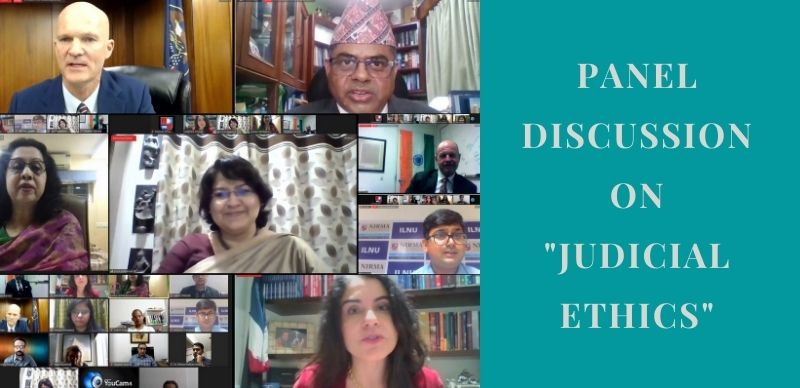
A Panel Discussion on “Judicial Ethics” was organized by Institute of Law, Nirma University as part of its International Teaching Month-2021. The institute hosted Judges from India, United States, Brazil and Nepal. The august speakers for the session included: Hon’ble Justice Abhilasha Kumari, Judicial Member of Lokpal & Former Chief Justice, Manipur High Court, Hon’ble Judge Andrea Galhardo Palma, Civil Law Judge, Sao Paulo State Court, Brazil, Hon’ble Judge Keith Barnes, Associate Presiding Judge, Fifth Judicial District, Utah, USA, and Hon’ble Justice Anil Kumar Sinha, Judge, Supreme Court of Nepal.
Justice Abhilasha Kumari highlighted that in every society, primitive or evolved, democratic or subscribing to any other form of government, the need has always been felt for an independent and impartial judicial system. She stated that there cannot be an airtight definition of Judicial Ethics.
However, she said that to maintain independence and integrity of the judiciary, it is important that judges remain above reproach. She stated that judges undertake the Constitutional Oath at the beginning of their tenure. Adherence to rule of law, independence and impartiality in duty are ingrained in the Constitutional Oath. Judicial Ethics have much wider implications than just prescribing a code of conduct for professional purposes; it casts a solemn obligation on the judge to accordingly shape their persona in a holistic manner.
She stated that Judicial Ethics can be considered to be a self-imposed code of conduct. She also emphasized that the judge must thoroughly know the laws of the land and apply it judiciously and judicial integrity is at the heart of the Judicial Ethics. She stressed that Respect cannot be commanded, it has to be earned.
She also referred to Restatement of Values of Judicial Life which reiterates universally norms, guidelines and conventions observed by Judges Uplifting the perception of the judiciary in the eyes of the common man should be one of the goal of the judicial officers.
J. Keith Barnes emphasised that “Ethics simply starts with you” It is important that we are honest and ethical with ourselves – that is the beginning of ethics. Judge Barnes shared his experience of cases which he dealt with as a Judicial Officer. He highlighted that the individuals involved in law enforcement should ensure that while dealing with the individuals, they must maintain their integrity.
He stated that honour belongs to those who never forsake the truth, even when things seem dark and grim. He then discussed the different cannons that judicial officers follow in the US. It is simply – integrity and independence. He also elaborated on the challenges that were faced in the US judiciary in light of the current pandemic. He discussed the challenges that come with being a judge, such as the idea that at some point the judge might have to sign a death warrant for some person. He emphasized that the judges should be compassionate and be respectful towards the parties involved.
Hon’ble Justice Anil Kumar Sinha shared his experience of judicial ethics in Nepal. He highlighted that confidence in ourselves and the confidence to uphold the Constitution of the country constitute two significant qualities in any judge. The code of conduct comes from within the judges, as they embark on their journey and realize their responsibilities of imparting justice.
Judges should not be influenced by their past, and must strive to live in the present. They should not be affected by their political and religious affiliations. This constitutes a significant part of judicial ethics too. He highlighted the challenges that Nepal judiciary has faced over decades such as lack of funds, lack of efficient staff, backlogs, lack of facilities and how the officers are constantly striving to work for its development.
Hon’ble Judge Andrea Galhardo Palma stated that Being a judge is not only a job, but a mission to ensure justice delivery across the country. She stated that Judges can fail sometimes, however it is important that they continue to maintain highest standards of judicial conduct. She emphasized that being prudent, diligent, transparent, and respecting client confidentiality are some important qualities that judges must always abide by.
Earlier, Prof. (Dr.) Purvi Pokhariyal, Dean and Director, Institute of Law in her inaugural address stated that deliberation on ethical conduct in all aspects of professional dealings is very crucial and complex and thus it’s important to discuss these. The session was ably moderated by Prof. Neeraj Sharma, Asst. Professor (Law). Mr Aadesh Shinde, 4th year student at the institute delivered the vote of thanks.